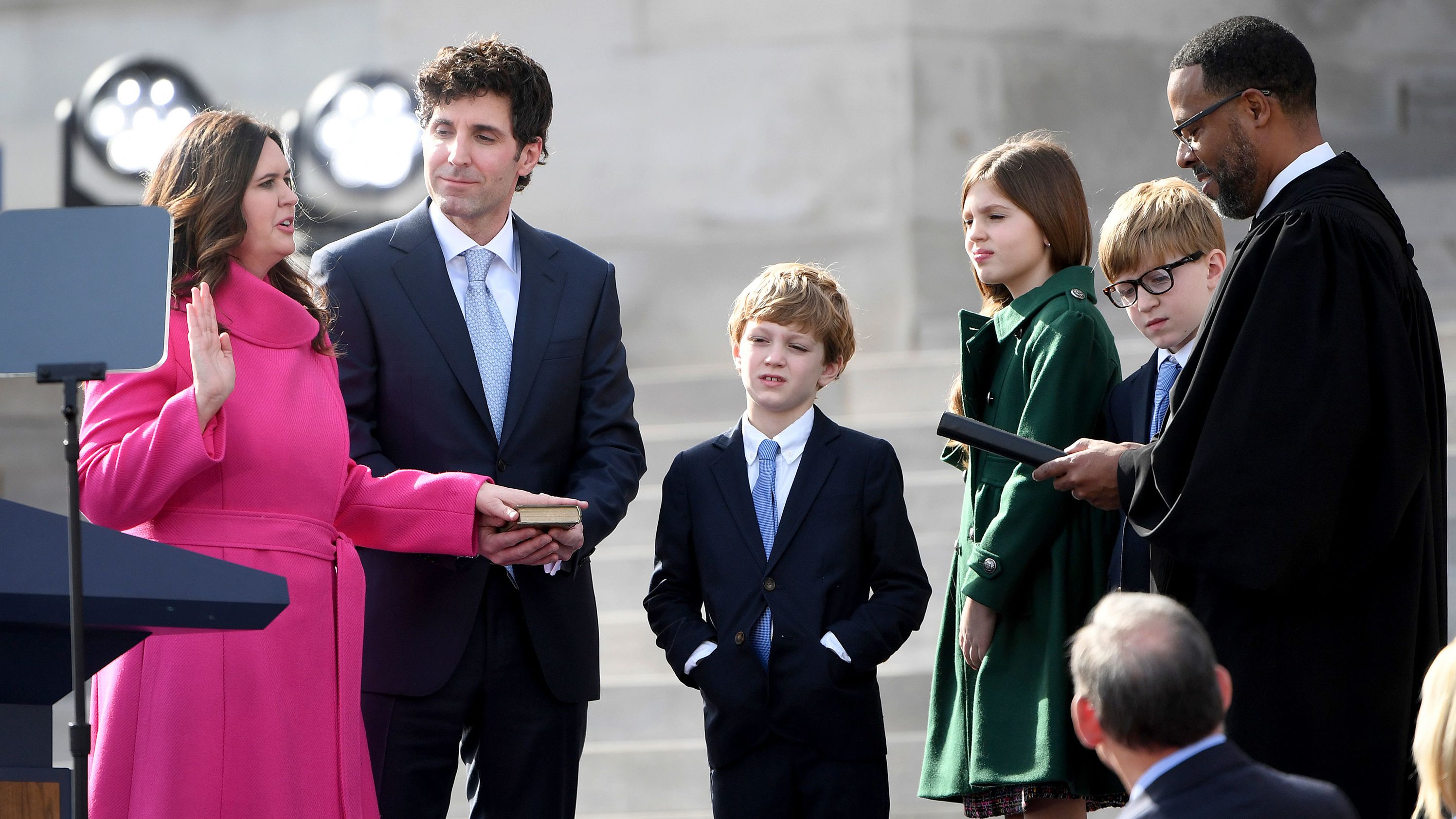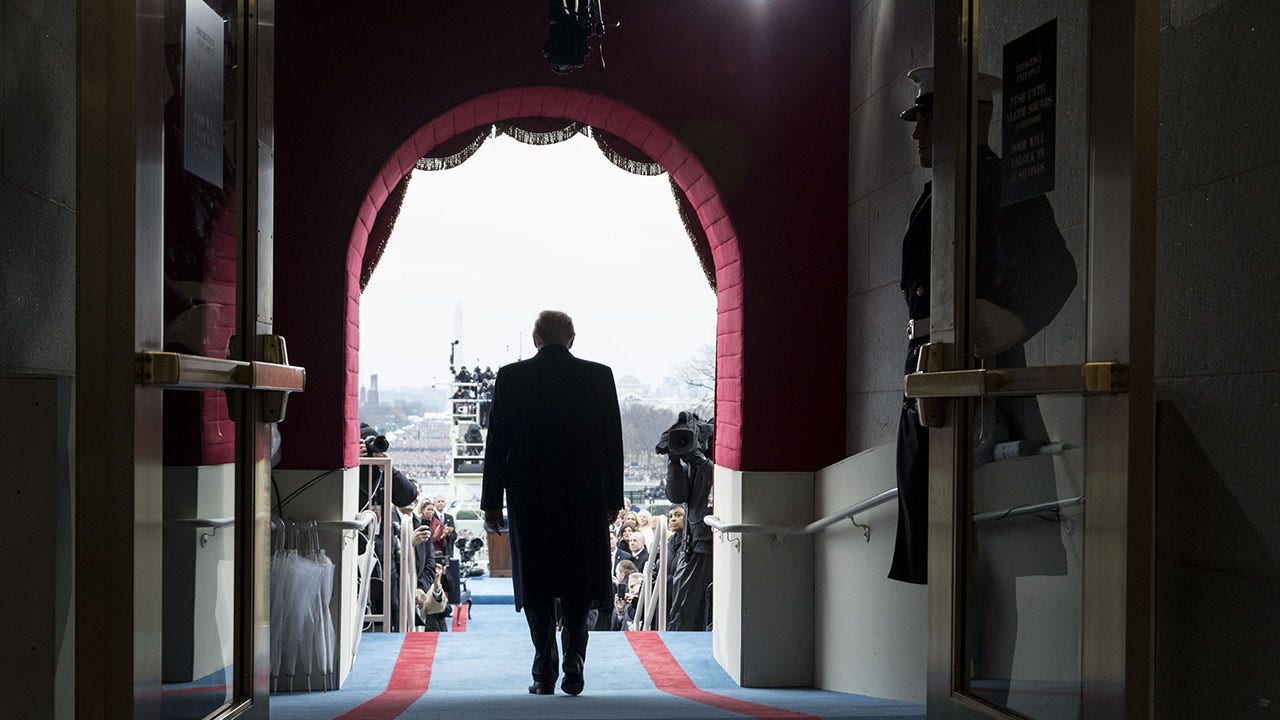
(Trends Wide) — Arkansas Gov. Sarah Huckabee Sanders signed an executive order this week banning the use of the term “Latinx” on official state documents, saying the government must use “ethnically appropriate language.”
Sanders, a Republican who gained notoriety in the United States when she was White House press secretary under the Trump administration, signed several orders on government regulations during her first day as governor Tuesday.

Arkansas Governor Sarah Huckabee Sanders called the term “Latinx” “ethnically insensitive” in an executive order signed Tuesday. (Credit: Will Newton/AP)
“The government has a responsibility to respect its citizens and use ethnically appropriate language, especially when referring to ethnic minorities,” the decree read.
The term “Latinx” has emerged in recent years as a gender-neutral word among Hispanics or Latinos, but it has become a controversial issue for many.
“Latinx” was meant to be an alternative to “Latino” or “Latina” for people who do not identify as male or female, or who do not want to be identified by their gender. Numerous activists, academics, politicians, and businesses have embraced the term “Latinx” to be more inclusive.
Alexa Henning, the governor’s spokeswoman, said the decision to reject the use of the term was made after hearing feedback from Hispanic leaders in the state, state legislators and high-ranking members of their staff.
“During the transition we have found cases where this term is used. Specifically, the Arkansas Department of Health has a Latinx Public Information coordinator and a Latinx Outreach coordinator. As the governor said when signing this executive order, she will not allow this government uses culturally insensitive words,” Henning said in a statement.
In the executive order, Sanders noted that his administration’s policy is to “prohibit the use of culturally insensitive words for official state government business” and ordered all state agencies to review their official documents and submit a report to him detailing their use of the words. terms “Latinx”, “latinx”, “Latinxs” or “latinxs”.
All state offices, departments and agencies must replace those terms in their documents with variations of “Hispanic” or “Latino” within 60 days, the order says.
The term has been criticized for being difficult to pronounce in Spanish, for its lack of popularity, and for being another way the United States exerts its influence over Latin America.
“As an immigrant, the use of the word ‘Latinx’ is not grammatically correct according to the RAE (Royal Spanish Academy), therefore I don’t use it in my day-to-day life,” Laura Estefenn, a public relations specialist at Atlanta that is Colombian.
Sanders’ decree also brought up the issue of the Royal Academy, as well as a 2020 Pew Research Center survey that found that only one in four Hispanic or Latino adults had heard of the term “Latinx,” and just 3% of them used it to describe himself.
Other politicians have also made comments against the use of the term.
In November, Republican Rep. Monica De La Cruz of Texas mocked the use of the word during her victory speech.
He called his victory “a victory for each and every Hispanic who loves the Spanish language and doesn’t want to be called Latinx.”
Ruben Gallego, a Democrat from Arizona, tweeted in 2021 that his office cannot use “Latinx” in official communications.
“When Latino politicians use the term it is in large part to appease wealthy white progressives who think that’s the term we use. It’s a vicious cycle of confirmation bias,” he tweeted.
Sanders previously worked in the George W. Bush administration for two years. She later ran her father’s campaign in 2008 for the Republican presidential nomination and was his campaign manager for his 2016 candidacy.
She took over as White House press secretary in 2017. The Republican left office in 2019 as a controversial figure on the national scene, serving as one of former President Donald Trump’s most trusted and unwavering defenders.
‘Politically, we don’t need to use the term to represent all of us’
Tanya Rodríguez-Hodges, a member of the South Carolina Commission on Minority Affairs’ advisory committee on Hispanic/Latino affairs, said she would support Gov. Henry McMaster, a Republican, if he decides to issue a similar executive order.
“I feel like, politically, we don’t need to use the term ‘Latinx’ to represent all of us as a group of people,” said Rodríguez-Hodges, a Puerto Rican and executive director of the advocacy group Latino Communications Community Development Corporation.
She told Trends Wide she doesn’t think the term should be used exclusively to describe the community, especially if it excludes other terms like Latino, but said it “came up with good intentions.”
“I admire our youth for taking something that they felt was not gender neutral and changing it as an identifier to represent who they are, where they are right now,” Rodriguez-Hodges said.
Although Latino or Hispanic are the most common terms to describe the community based on its ethnic origin, others are also used, such as Chicano. The latter is typically used by Americans whose families have lived north of the Rio Grande since before the territories became part of the United States. It is associated with the Mexican-American civil rights movement of the 1960s, also known as the Chicano Movement.
At the grand opening of the Cheech Marin Center for Chicano Art and Culture in Riverside, California, last year, comedian Cheech Marin said, “That word (Latinx) is for my grandchildren.”



